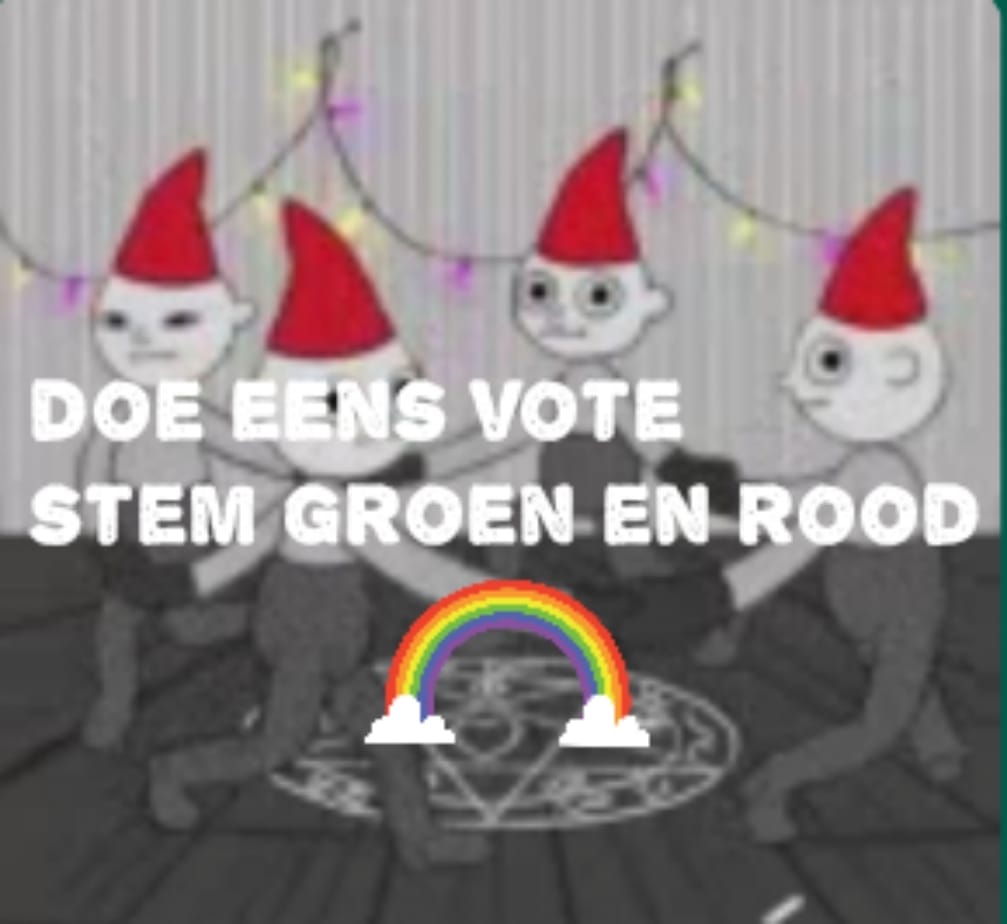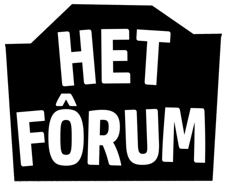By Janne

You know it, you love it, the national elections are almost here! Happy, happy, joy, joy!
You can probably tell that I’m not exactly stoked about the upcoming elections.
Don’t get me wrong – there is a definite glimmer of hope for those of us on the left side of the political spectrum, especially because the parties on the left seem to have an actual shot at leading the country this time. And that’s also quite scary. The first thing on my mind was: “how are they going to fuck it up this time?”.
Yes, I’m being pessimistic, but I can assure you that it’s all trauma-based. You see, I was eighteen just as Balkenende of the CDA (Christian democrats) was doing his final term as Prime minister in 2009 (yes, you may correctly assume that I am old). Every single time that I have been able to vote after that, Mark Rutte has been the fixture at the head of this country. To put that in context: my students at the secondary school that I teach at don’t even know of any other sitting Prime Minister than good ole’ Marky Mark. He really has become pretty much the only known face of politics for most of the (younger) generation, especially the kids and teenagers roaming The Netherlands. For them, it’s a passive perception… they see this unassuming looking man with his glasses and his unflashy suit cycle to work and clean his own coffee spills, and sometimes use his (painfully) broken English to tell other world leaders “no”. And remember: most of their opinions are rooted in subjectivity brewed by their parents and caregivers. Since I teach at an “elitist” school (Stedelijk Gymnasium Leiden), a lot of them probably have parents (I assume) who actively like the guy and his party by extension. For those kids, anything the VVD does is either far away from their daily lives (“ver van hun bedshow”), a meme, uninteresting, or somewhere in the lawful / neutral category. The only shocking news that reaches them is that Mark Rutte has recently quit. I believe it’s the responsibility of the left to reach these teens before they start to vote, and we don’t have a lot of time.
I am sadly not as blissfully unaware as they are (ignorance is bliss, they say). Now is the time to confess that I used to be a centrist voter, maybe even leaning to the right… Yes, I know, gasp! But that has all since brutally been torn away from my mind, due to three distinct events:
1. The student grants were cancelled while I was doing my BA degree, and suddenly thousands of students were racking up thousands of Euros of student loans.
I was always able to work during my time at university, but that was the exception rather than the rule. I saw people actively getting ruined by this; having to move back home, beg their parents for money or drop out. I have friends who were model students, who still have an enormous amount of student debt crippling them. And there was So. Much. Lying. about this from our political leaders (specifically from the minister for education at the time, stating that we needn’t worry about it, while knowing full well that they would crank up the interest rates). The worst part of this is, that D66 (Democrats), the self-proclaimed “party for students” actually voted in favour of this system. The trust vanished, and pessimism grew.
2. The scandals and mishandling of many, many things; including the childcare benefits scandal, or “toeslagenaffaire”, in which many poorer parents and children in our society suffered enormous consequences. Thousands of parents in The Netherlands were wrongfully suspected of fraud when it came to childcare benefits, and they were required to pay back huge sums of money to pay it off. Some even lost their children to the municipality foster care system due to the poverty that they endured. This is – ofcourse – completely unacceptable, and also racist and discriminatory when you figure out how and why they targeted certain people. This whole scandal and the elections and polls afterwards really showed me that the VVD voters really don’t really give a shit about poor people; the approval ratings were still suspiciously high. It really proved to me that the right is more unified in their racist ‘surveillance’ practices than they claim to be.
3. Protesting because of climate change being met with crazy government violence.
I live in The Hague, quite close to the A12 highway. It’s not uncommon for me to witness the protests going on there, or on the Malieveld for that matter. I have seen, with my own eyes, how peaceful protest is met with over-the-top police handling. A group of pregnant women called “Moeders van de toekomst” were hit with hard and cold water cannons this summer, even though they were peacefully singing lullabies on the side of the road. Children were covered in bruises because they were torn away from the highway, apparently not having gotten a softer treatment for being children. I also saw (elderly) people with blood on their foreheads. I realised that the news doesn’t really show this, and instead constantly remarks on how blocking an essential highway is “unfortunate” and maybe even “unnecessary”. Well, apparently, it’s not. Our planet is obviously burning – and it should be everyone’s top priority.
I often catch myself ruminating on the disasters that were the coalitions with the VVD (liberal ‘conservative’ right) and PvdA (Labour party), which I actively endured when I went off to study English in Leiden in the twenty-tens. Or the even worse short-lived PVV (populist right wing) and VVD coalition… that was a trip. I remember the political discourse and debates rooted in blatant racism (“minder, minder”) and the many coalitions based on pure corporate greed. None of the coalitions in the past twenty years were any good in my opinion, and all of them did severe damage to our political climate (and our actual climate) in some way or another. The failing cabinets also caused the extreme right to rise. The FvD was able to cling to a dissatisfied follower base because the sitting government actively fuelled and fanned the fires on the side of populism, especially during Covid. Poor people become angry, and then their anger turns into ignorance under the wrong circumstances.
So how does this tie-in with ‘infighting from the left’? My strong belief (backed up by some polling data by the CBS) is that the VVD has been so successful in amassing followers because their voter base is not incredibly critical by nature. Voters on the left tend to be idealistic, critical, and pessimistic about the future, like me. I know relatives who vote for the VVD because they truly believe that they are a working buffer between the populist right and the left. This relative told me that “the VVD is the only party that is large enough to counter the FVD”. Yes, he actually believes that, and he also doesn’t know (after confrontation) what the VVD actually wants to achieve. Leftie voters, however, are incredibly nit-picky and pessimistic when it comes to the party programmes. This ‘type’ of left voter causes an array of problems that have always worked in favour of the right leaning parties, and more importantly: against a possible left coalition.
Putting it plainly, the left side of the political spectrum can roughly be put into three categories; greens, socialists and (Christian) moderates. They tend to disagree on things like nuclear power, euthanasia, the farmers crises, housing and grants, and they treat these discrepancies in their programmes like life-or-death situations.
They are not.
Even though the left-wing mottos and end goals mostly align, they tend to fight over these nuances and priorities to such a degree that it seems like they are mortal enemies. Of course, I am not claiming that we should have a two-party system like the US or UK, where there is one unified Right and one unified Left. That would be disastrous and undemocratic. Ofcourse, I think it’s a good thing that we have multiple ‘flavours’ to choose from, including multiple types of left-wing parties. But I don’t think it’s a crime to work together, in fact I think it is necessary. Especially now.
The thing that I specifically cannot stand is the incessant infighting to the point that parties claim to be diametrically opposed and “unable to form a coalition” together. That is simply untrue. The centre-right does not have to do this, and if they do, they will simply start to openly flirt with the far-right. I believe that this is what has caused the right to unify and amass a more stable voter base (also, like I said, right-wing voters tend to be inherently loyal to a party, despite their points not benefitting those voters, as well as being less critical).
When the PvdA decided on a de-facto merge with GroenLinks (green party), the first critical voices I heard were a lot left-wing friends, relatives and acquaintances despairing that their opinions were now somehow diluted. As if the whole coalition system wouldn’t dilute them by its very nature! That’s the point of a coalition! You discuss which points get implemented, and which don’t. You find middle ground. It’s just the way it is.
A life-long PvdA voter even told me that he wouldn’t ever vote for the PvdA again because of this ‘merge’. He said that “they are worse than the FvD now”. I would say that this example of a hyperbolic and unsatisfiable attitude is typical of the left, and I’ve seen it countless times. Since I truly believe that left will not be able to form a coalition without allying themselves to each other, it seems blatantly stupid to me that people would be against this ‘merge’, even if they don’t agree about some or all of the gains and losses along the way. I even heard that some people were going to switch to more centre-right parties because of their dissatisfaction, like a child vaping to spite their parents for grounding them. So what am I trying to say here? Well, I urge you to stay critical, but also to be open-minded towards fellow non-right voters. It goes against some of our ideals, yes, but we have to start playing the game of alliances. If not, we will easily get another eight years of (centre-)right cabinets who will escalate their agenda to the point that none of our ideals will be implemented. We need to stop gatekeeping people for “not being left enough”, or to judge people harshly for being ‘centre-left’ (I’m looking at you, Zoutchat). We have to be allies (not necessarily friends) for this to work.
